TCRSS is tremendously grateful for the talented speakers, local leaders and community participants who have made each of these events a resounding success, and we look forward to our continued partnership in the coming year.
Community Health Dialogue
HEALTH in EQUITY – How Community Development can Raise Health Equity in Low Income Areas and Promote Better Healthcare for ALL
 This dialogue continued the conversation on the reginal health disparities in Travis County that was started nine months earlier. This time TCRSS Director Dr. Miyong Kim moderated a mixed panel of UT faculty and community organization leaders who each shared their expertise in the areas of research data, current resources, successful programs, and the social determinants of maternal, infant health. This brought some new perspectives to the table as well as a bit more specificity on what kind of long term effects these disparities have on a community. The Audience was engaged and showed a lot of interest in this issue and were eager to discuss ideas for action.
This dialogue continued the conversation on the reginal health disparities in Travis County that was started nine months earlier. This time TCRSS Director Dr. Miyong Kim moderated a mixed panel of UT faculty and community organization leaders who each shared their expertise in the areas of research data, current resources, successful programs, and the social determinants of maternal, infant health. This brought some new perspectives to the table as well as a bit more specificity on what kind of long term effects these disparities have on a community. The Audience was engaged and showed a lot of interest in this issue and were eager to discuss ideas for action.
LaVerne Gallman Distinguished Lectureship in Nursing
How Patient-Clinician Partnership Changes What’s Possible
 After beating stage IV kidney cancer in 2007 Richard Davies deBronkart known widely as “e-patient Dave” became a blogger, health policy advisor and international keynote speaker. He is now one of the world’s leading advocates for patient engagement. Urging patients to educate themselves and share knowledge with one another, while urging doctors to collaborate with patients. He believes informed self-care is critical for better health and makes for a richer, more collaborative partnership between physicians and their patients. This message was received by a multi-disciplinary audience of over 200 students, staff, faculty, alumni, and community members.
After beating stage IV kidney cancer in 2007 Richard Davies deBronkart known widely as “e-patient Dave” became a blogger, health policy advisor and international keynote speaker. He is now one of the world’s leading advocates for patient engagement. Urging patients to educate themselves and share knowledge with one another, while urging doctors to collaborate with patients. He believes informed self-care is critical for better health and makes for a richer, more collaborative partnership between physicians and their patients. This message was received by a multi-disciplinary audience of over 200 students, staff, faculty, alumni, and community members.
Community Health Dialogue
Place and Race Matter
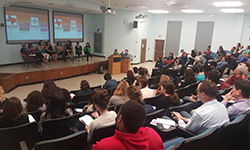 This event was a follow up to our previous community engagement forum focusing on health disparities in Austin/Travis County. This Dialogue was held at Huston-Tillotson University and attended by over 100 members of the community including city council members, health workers, students, and leaders of other CBO’s. This talk show style dialogue included a panel of representatives from GAVA, Latino Health Care Forum, Mama Sana/Vibrant Woman, and the Alliance for African American Health in Central Texas who engaged the audience in a solution focused dialogue on the next steps toward achieving equitable health for ALL members of our community. Time Warner Cable showed up to cover this event and ran the story later “Travis County Seeks To Promote Health Equity For Minorities” that night.
This event was a follow up to our previous community engagement forum focusing on health disparities in Austin/Travis County. This Dialogue was held at Huston-Tillotson University and attended by over 100 members of the community including city council members, health workers, students, and leaders of other CBO’s. This talk show style dialogue included a panel of representatives from GAVA, Latino Health Care Forum, Mama Sana/Vibrant Woman, and the Alliance for African American Health in Central Texas who engaged the audience in a solution focused dialogue on the next steps toward achieving equitable health for ALL members of our community. Time Warner Cable showed up to cover this event and ran the story later “Travis County Seeks To Promote Health Equity For Minorities” that night.
2016 St. David’s CHPR Conference
The Physical Environment’s Influences on Health
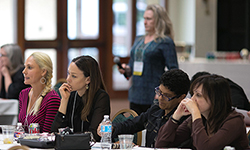 TCRSS was a proud co-sponsor of this year’s St. David’s CHPR conference focusing on the built environment and its influence on our health. Keynote speaker, Dr. Linda Mc Cauley, Dean of the Emory University Nell Hodgson Woodruff School of Nursing, brought her expertise on environmental and occupational health and shared results from her interdisciplinary study using participatory research models to study pesticide exposure among minority communities. This half-day event included poster presentations and highlighted the many transdisciplinary collaborative opportunities among researchers interested in health and the environment.
TCRSS was a proud co-sponsor of this year’s St. David’s CHPR conference focusing on the built environment and its influence on our health. Keynote speaker, Dr. Linda Mc Cauley, Dean of the Emory University Nell Hodgson Woodruff School of Nursing, brought her expertise on environmental and occupational health and shared results from her interdisciplinary study using participatory research models to study pesticide exposure among minority communities. This half-day event included poster presentations and highlighted the many transdisciplinary collaborative opportunities among researchers interested in health and the environment.
Gallman Summer Research Institute
Item Response Theory
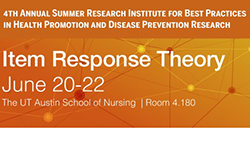 Our 4th annual Summer Research Institute for Best Practices in Health Promotion and Disease Prevention Research focused on Item Response Theory. To unpack the nuts and bolts of this complex concept we invited two very distinguished experts on the subject. Dr. Kitty Chan from Johns Hopkins Bloomberg School of Public Health who’s research focuses on measurement issues, particularly the application of phychometric techniques using IRT for the study of mental health, and Dr. Tam Nguyen from Boston College’s William F. Connell School of Nursing who also uses psychometrics to study health promotion/disease prevention in vulnerable/hard to reach populations. Over the course of this two and a half day workshop, these talented researchers led a group of 24 mostly nursing PhD students and a few faculty through IRT framework of modern measurement and improved scales using computer adaptive testing that can raise quality and efficiency while reducing respondent burden.
Our 4th annual Summer Research Institute for Best Practices in Health Promotion and Disease Prevention Research focused on Item Response Theory. To unpack the nuts and bolts of this complex concept we invited two very distinguished experts on the subject. Dr. Kitty Chan from Johns Hopkins Bloomberg School of Public Health who’s research focuses on measurement issues, particularly the application of phychometric techniques using IRT for the study of mental health, and Dr. Tam Nguyen from Boston College’s William F. Connell School of Nursing who also uses psychometrics to study health promotion/disease prevention in vulnerable/hard to reach populations. Over the course of this two and a half day workshop, these talented researchers led a group of 24 mostly nursing PhD students and a few faculty through IRT framework of modern measurement and improved scales using computer adaptive testing that can raise quality and efficiency while reducing respondent burden.
 HER participated in the launch of the Office of Sustainability’s Green Offices Program. The program is a points-based certification process that empowers members of UT faculty and staff to elicit change in their workspace. The student-led program, within the
HER participated in the launch of the Office of Sustainability’s Green Offices Program. The program is a points-based certification process that empowers members of UT faculty and staff to elicit change in their workspace. The student-led program, within the  The program also asked each participating office to designate a Green Office Steward to serve as the office’s representative and champion of the program. Our Center Coordinator Kelli Anne Royse was up to the task and quickly began going down the checklist and implementing both operational and cultural changes toward more sustainable practices. When the 4 month program ended, we had earned 84 points achieving the Gold level of certification!
The program also asked each participating office to designate a Green Office Steward to serve as the office’s representative and champion of the program. Our Center Coordinator Kelli Anne Royse was up to the task and quickly began going down the checklist and implementing both operational and cultural changes toward more sustainable practices. When the 4 month program ended, we had earned 84 points achieving the Gold level of certification! AUSTIN, Texas — The University of Texas at Austin School of Nursing and community partners Mama Sana/Vibrant Woman (MSVW) and the Alliance for African American Health in Central Texas (AAAHCT) will collaborate on projects designed to address health care inequalities after receiving two six-year grants totaling more than $3 million from the City of Austin. The health equity grants, the first ever awarded by the city, will address health disparities in underserved populations.
AUSTIN, Texas — The University of Texas at Austin School of Nursing and community partners Mama Sana/Vibrant Woman (MSVW) and the Alliance for African American Health in Central Texas (AAAHCT) will collaborate on projects designed to address health care inequalities after receiving two six-year grants totaling more than $3 million from the City of Austin. The health equity grants, the first ever awarded by the city, will address health disparities in underserved populations.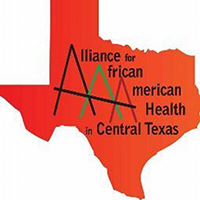 African Americans in Travis County continue to have higher rates of mortality from cancer, heart disease and diabetes, and this disparity crosses economic lines. The AAAHCT project will address chronic disease among African Americans by providing a wellness program in which participants identify specific health goals they want to achieve and then receive individual and group coaching and connections to resources to assist them.
African Americans in Travis County continue to have higher rates of mortality from cancer, heart disease and diabetes, and this disparity crosses economic lines. The AAAHCT project will address chronic disease among African Americans by providing a wellness program in which participants identify specific health goals they want to achieve and then receive individual and group coaching and connections to resources to assist them.
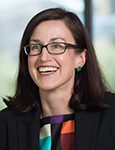
 Tracie Harrison
Tracie Harrison
 Marge Benham-Hutchins
Marge Benham-Hutchins The Center for Health Equity Research (HER) has had a productive and exciting 6 months since our last newsletter. We continue to work hard to achieve our core mission to (1) foster
The Center for Health Equity Research (HER) has had a productive and exciting 6 months since our last newsletter. We continue to work hard to achieve our core mission to (1) foster 